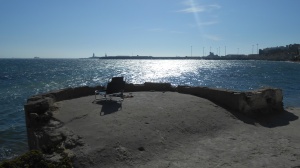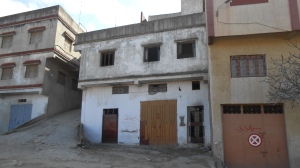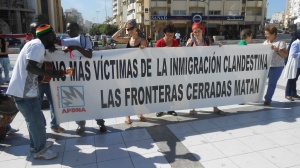After spending two weeks hitching down from England and two weeks drinking myself stupid in Tarifa, I finally made the jump over to Africa. I hitched around to Algeciras and took the ferry across the short stretch of water to Tanger Med, forty or so kilometres out of Tangier.

Remembering the delights of hitch-hiking in Morocco, I decided to hitch into town instead of getting the bus. I got picked up by the first car and even with a language barrier the driver was all smiles. He randomly gave me a carton of milk, which I showed slightly overeager gratitude for, and just before leaving the car he insisted on giving me a hundred Dirham note. I was kindly dropped right outside the main port in Tangier, where I made my way through the gauntlet of hash dealers and hotel hustlers towards the Medina.
As I approached the first slope upwards into the familiar old city, I was greeted with a young boy stood high above me, looking down in my direction. He wore a glazed look and held a bag to his mouth, inhaling and exhaling calmly into it. Glue, the drug of choice for young boys and other penniless street dwellers.
It was then, that I started to remember the harsh realities of life for the poor in Morocco, especially in Tangier. People reduced to extremes like degenerative drugs in the face of poverty, in a city with little mercy. With those thoughts in mind, I entered the claustrophobic streets of the Medina.

Recognising many of the places that I passed, I recalled vivid memories of things that happened in them: making local friends; playing music; smoking joints; avoiding drug pushers and so on. After wandering through the confusing twists and turns of narrow side streets, I found the same hotel I had stayed in almost a year before. Surprisingly, the owner seemed to remember me and tried his best to speak to me in French.
I got the impression that the place was usually for Moroccan travellers and didn’t often have foreigners to stay, but the guy emitted a welcoming presence and I proceeded to ask about a room. Usually the price would be thirty Dirhams but I had to pay double because I was on my own. We settled on fifty Dirhams and I paid for two nights with the hundred that was given to me by the ride into town. I cleansed myself of the Spanish beach filth before heading back out into the streets.
I visited an internet cafe to see if I could find a connection to my Gambian friend, Baye, from the year before, but for all I knew he was already in Europe. Remembering an old hang-out place by a popular sandwich stand, I decided to try my luck at finding him through possible friends.
Immediately after arriving there, a Gambian man with a broad smile befriended me and welcomed me to sit with him. His name was Sunday and had no problems diving straight into his life tales, mostly about Tangier and the last couple of years here. His most enthusiastic subject, though, was his aim for Spain, his discussion of which was made more poignant by the fact that we could see it across the short strait from where we were sat. I hung out with Sunday for a while, asking general questions about his reasons for taking on this difficult journey. He mostly replied with answers of political corruption and poverty.
From what I was told, The Gambia is a beautiful country, with beautiful people and beautiful ideas – those ideas being to live an easy and tranquil life. Poverty is everywhere, but people try to see through it. Good food, friends and family are the basic desires for a tranquil life. I’m told that the first president – Sir Dawda Jawara – was ‘The Peoples President’. In office for 24 years, Dawda was well respected and gave Gambia the reputation of being an incorruptible country – a rarity in Africa.
In 1994 the presidency was overthrown by the Armed Forces Provisional Ruling Council: a military coup led by Yahya Jammeh, giving him the presidency in 1996. Being a military man, Jammeh suspended the existing constitution; sealed the borders; and enforced a curfew. Along with Jammeh’s many bizarre claims of magical powers and the harsh laws he has introduced in the Gambia, freedom of press has largely been quashed and the country’s Human Rights reputation has crashed with a nosedive.
Sunday and I looked out over the port a while longer, sparking the occasional conversation. Then out of the blue, a stranger came and spoke rapidly to my new friend. A moment later, the new arrival whisked me away. I never saw Sunday again and heard some months later that he had successfully made it to Spain using a paddle boat.
After an hour’s walk away from the port and feeling very lost, I arrived with the new stranger in some run-down area which I was told had a lot of ‘Mafia’ – a term I later found out referred to anyone who was involved in anything remotely abnormal. I was ushered up the stairs and into the house, where I was immediately told that Baye wasn’t there.

Feeling a bit bemused, I had a sudden wave of anxiety caused by the thought that I had basically shown up to a place I knew nothing about, with people I didn’t know at all, and not the faintest idea as to what I was going to do there. I thought I was intruding perhaps, similar to treating them like a tourist attraction.
I just stood awkwardly in the room, amongst a bunch of guys speaking a language I couldn’t recognise. After asking, I was reminded that it was Wolof, one of the main native languages in Gambia and Senegal.
But as all things turn out to be, it wasn’t as scary in the end as I’d thought it was when I had first arrived. The guys that were looking after me were really lovely, even with the language barrier they made a strong effort to communicate with me. They made tea, gave me bread and rolled a couple of joints, putting me at ease. I began to relax.
A while later, Baye came back, and had a German guy with him. He told me something about them having been on the other side of town and that he was sorry for not coming sooner. I assured him that it wasn’t a problem and that everyone else here had taken good care of me while I’d waited.
He introduced the German guy to me as Patrick and said that he was here as an activist, collecting information and stories to take back to Europe. Patrick said he had been working closely with a theatre group that create and perform productions about the hardships of migration.
Having been here for one month, he stated that he had learned many things about the corruption within the government; migration problems; police brutality; and so on. He spoke to me like he knew far more than I did – which was true of course – but I found him a little patronizing and difficult to speak with. So I held my attention with the residents of the house instead.
Baye told me that there would be a demonstration the next day outside Ceuta. The demonstration was going to be in awareness of the 2005 incident in which many migrants had made an attempt to cross over the fences surrounding the city. Several migrants had died in that attempt, mostly from Moroccan gun fire.
I was told that the theatre group would be going and that they would be doing a production outside the fences in front of the people coming in and out of Ceuta. Baye also revealed that he and some friends from the house would also be in the production and that they had been practising for weeks. This was a nice surprise and I found myself looking forward to seeing the collaboration.
As I was staying in a hotel, I had to go back to the Medina and stay the night there, so I said my goodbyes, and that I would meet them outside the French consulate on The Boulevard and travel together with them to Ceuta. The next day, I woke early and made for the consulate right away. I made sure I was thirty minutes early just in case of changes.
When I arrived, I saw that there was no one around so I sat outside of a café and ordered a coffee. I tried to call the number I’d been given but no one picked up. I sat around for a while, always keeping an eye out for people that may have been involved. But no one came, and I was stuck with having to think about my options.
After some time I began to get worried about what was happening. I decided I would try to make my own way to Ceuta and hopefully find them there. I walked out of the city towards Tetouan, which is the city close to Tangier and Ceuta. I collected some cardboard along the way and copied the Arabic name for Ceuta that I’d spotted on a road sign.
Stood around on the road to Tetouan, I tried to flag anyone and everyone that was going by, but to my frustration, no one would stop. I tried other things, like a different sign or no sign at all, but for some reason it just wasn’t working. I stood there for an hour or so until it was almost mid day, I took it as an indication that I just wasn’t going to Ceuta that day. I stupidly told myself that I would catch the next demonstration, not knowing at the time that demonstrations and protests are illegal in Morocco.
I headed back towards town and made the long walk back along the Boulevard. I came in sight of Place Al Ouman, which is a big square about half way up the Boulevard and noticed a crowd gathered in the middle. I walked closer to make out the people better and spotted Baye with some others I recognised from the Senegalese house.
I couldn’t believe my luck. I’d really thought they would’ve been in the midst of a demo in Ceuta at that moment. When I got there, I counted maybe a hundred people. About a third were migrants and some were Moroccan too, but a depressing few.

There was a long line of people facing out towards the busy main road of the Boulevard, holding a banner saying in Spanish ‘NO MAS VICTIMAS DE LA IMMIGRACION CLANDESTINA, LAS FRONTERAS CERRADAS MATAN’, meaning ‘No more victims of the clandestine immigration, closed borders kill’. There were also people taking it in turns with a megaphone, shouting anti-border chants in Spanish over and over again.
Speaking with Baye, he told me he’d woken up late that morning, and had also had trouble finding the rest of the group. Eventually when they’d found everybody, they’d all attempted to board the bus for Ceuta, but had been stopped by police and forced to stay in Tangier for the day. It seems that the police had known about the demonstration and had decided to intervene.
I wasn’t surprised though: this demonstration was in remembrance of several migrants that were shot dead by Moroccan police at the fences of Ceuta in 2005, an incident which had been well covered by the media, and had subsequently forced the Moroccan policy of using firearms at the borders to be changed.

Unfortunately, everyone decided that it would be too difficult and too costly for them all to go separately to Ceuta. So they’d chosen instead to stay in Tangier and do the demonstration in a high-end part of town like the Boulevard.
The police were also hanging around, keeping a watchful eye on the situation. At some point, a journalist from a French news channel was stopped by the police from filming and asking questions. I saw this happen a few times – every time someone raised a big television camera and pointed it at migrants the police would come and say it was forbidden.
There were a lot of discussions about what people wanted to try and get away with, eventually deciding to continue with performing the theatre production, right there on the Boulevard. People began to get ready, changing into their assigned costumes and preparing to stand in the gaze of the growing audience. A couple of performers walked around and shaped the crowd into a sufficiently large circle for the act to happen. Then finally, everyone was hushed quiet for the show to begin.
I hadn’t been explained the general message of the production at all and had no idea what to expect. It was just my luck that it turned out to be quite abstract, and was difficult to follow at times. It was about the beginning of civilization, how we were all equal until greed, corruption and racism came in and well… basically, there’s been fighting ever since, creating borders and divides within every aspect of life.

After the show was done, there was a lot of hand-shaking and back-patting before everyone started to leave. Baye had gotten quite excited about the whole thing and was making speeches to any person or camera that was in his close proximity. At one point he took the megaphone and started to sing anti-border songs. This went on a little longer, everyone clapping and singing along the best they could.
It was inspiring at times, to see him singing in front of these people, knowing that the police were all around and could have taken him away at any time. After it was all done and everyone had dispersed, going away in different directions, I walked up the boulevard with Baye and a few others from the house. I asked my friend what his thoughts were of the day. He replied: “Yeah man, the police, they stop us but we do the demonstration anyway. They stop us too many times, but not every time”.
I also asked how he had felt, standing in front of all those people and making his voice heard. He replied with: “Yeah, I don’t care whether I live or die now; I stand for my people and tell them to smash the borders”.
Lastly, I was asked if I wanted to pick up my things from the Medina and take them back to the migrant’s house. I agreed, and in doing so, had inadvertently moved into the house for the next few months.
